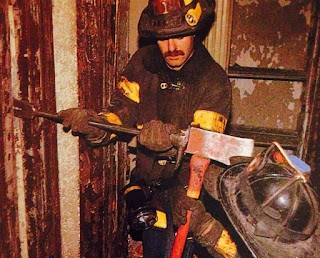
.
.
.
.
.
.
.
.
.
.
.
.
Recently, a small controversy raged over a photo of a firefighter NOT being in proper Personal Protective Equipment (PPE) while on a Ladder Company's turntable on the FB Page "The War Years."
While virtually all of the photos posted on that page were from the FDNY's "War Years" (the late 1960s through the 1970s - photos above), it hadn't originally been made clear that the photo in question was about a contemporary firefighter, who someone tried to report over that infraction. That photo was quickly taken down.
Many from those "FDNY War Years," took great offense to the idea that anyone would take issue with the earlier, more lax standards for PPE, at that time, believing that the comments about a firefighter being out of PPE, referred to those "War Years" firefighters.
A few people didn't understand the vehement defense of that bygone era by so many, but there was a sound reason for that.
Those "War Years" weren't only a different era, we were a different country, with a very different public service ethos.
Turnout gears wasn't even called "PPE," at the time because personal safety was considered secondary to the protection of life (with an emphasis on CIVILIAN life) and property.
That outlook remained through the 1980s and beyond, as many who got on the FDNY in the 1960s remained active well into the 80s and 90s.
Through the 1980s, at least in busy areas (parts of Brooklyn and the Bronx), not only did LCCs wear steel toed work boots and denim jackets, so did the OV...and the OV almost never wore a mask (SCBA) when entering a fire apartment through the fire escape window.
Breathing protection was NOT used during overhauling, nor on a roof and with some officers not in vacant buildings either.
Keeping Tower Ladder OVs from "riding the Bucket," or in some places, the roofman from "riding the aerial" were battles for Chief officers.
It's IMPOSSIBLE to judge that era by today's standards and trying to do that is actually, in many ways, immoral.
People thought differently, acted differently...and were DIFFERENT than those of today.
I got on in the 80s. My father got on in 1953. He, like many of that era, grew up in the Great Depression, fought in WWII...then went through the turmoil of that era (mid 60s through the 70s) in PDs & FDs.
They were a different breed...in so many ways, a BETTER breed.
The other day, someone brought up a 1957 article by William F. Buckley titled, "Why the South Must Win," as "proof" that that America was irredeemably "racist."
Buckley, had toured the South and was most appalled at the behavior of Southern blacks (with many holding education in low regard, defending criminality, etc) and he came away, like many educated Americans of the day, believing the segregationists ("the South") were right. That was an extremely common view among whites at the time.
By 1965, when William F. Buckley ran for mayor of New York, he may have been the first conservative to endorse affirmative action (AA), when AA was outreach & recruitment, NOT quotas/"preferences."
He also promised to crack down on labor unions that discriminated against minorities, a cause even his liberal opponents were unwilling to embrace.
The 1965 Buckley also pointed out the inherent unfairness in the administration of drug laws and in judicial sentencing and he advanced a welfare “reform” plan whose major components were job training, education and daycare."
It's impossible to judge others from an era we haven't lived in, nor really understand.
It's similar here. The prevailing view in Fire Departments and in most communities was that Fire Departments existed to protect others, with a secondary, sometimes tertiary concern for their own personal safety.
That's changed.
Today there is a primary emphasis on personal safety. That's new...that's recent and to many, it's inexplicable.
Today, the ethos is, "Take care of yourself FIRST, because otherwise you can't help anyone else." To that, many of that earlier age would say, "More's the pity."
Times HAVE changed.
All change is not "enlightened."
.
.




No comments:
Post a Comment